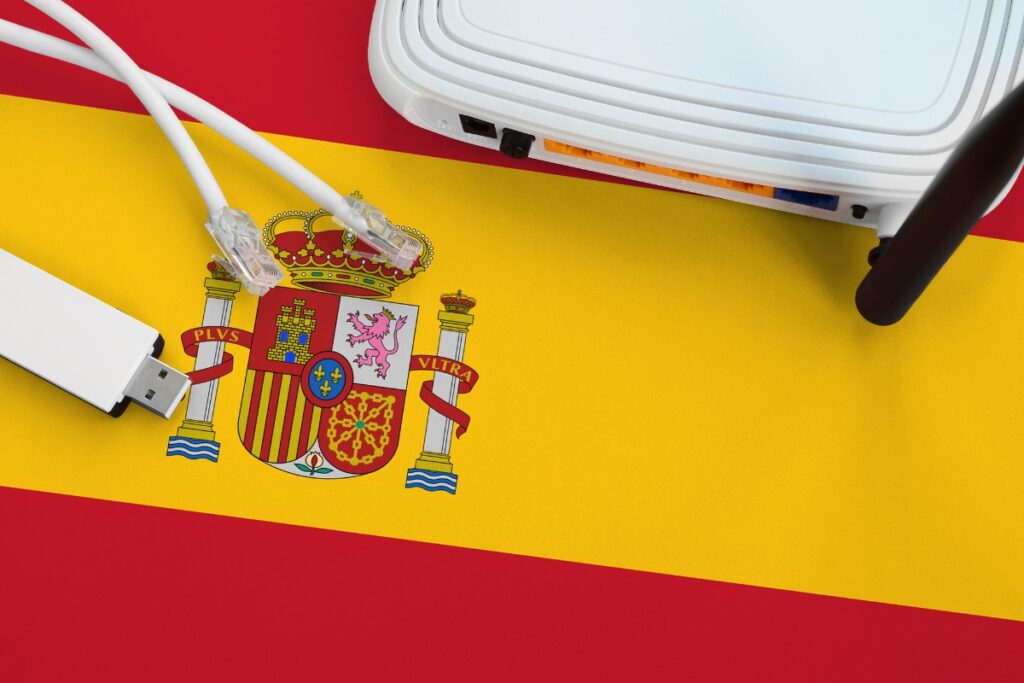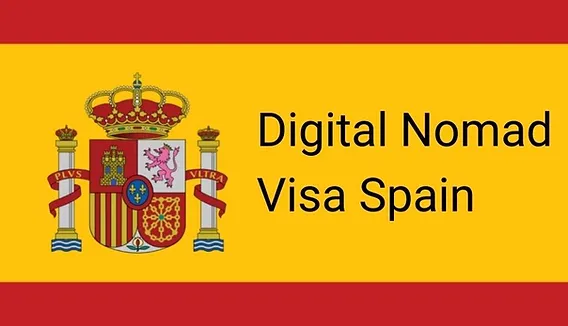Why Internet and Connectivity for Digital Nomads in Spain is a Top Priority?
If you’re a digital nomad considering Spain, you’ve probably wondered about the essential topic of Internet and Connectivity for Digital Nomads in Spain. Spain is a dream location for remote workers, but reliable internet access and connection options are at the heart of making it a successful base. Let’s break down what you need to know about Spain’s internet landscape, including Wi-Fi reliability, coworking spaces, the best connected cities, and options to set up shop efficiently and smoothly. For more detailed assistance on relocating to Spain as a digital nomad, check out this resource from Marfour International Law Firm.
How Reliable is Spain’s Internet for Nomads and Remote Workers?
When you think of Spain, images of sun-soaked beaches, vibrant cities, and rich culture come to mind. But for digital nomads and remote workers, one of the key factors to consider is internet reliability. After all, a stable connection is essential for getting work done and enjoying your adventures. Let’s dive into the ins and outs of Spain’s internet landscape.

State of Internet Infrastructure in Spain
Spain boasts a well-developed internet infrastructure, especially in urban areas. Major cities like Madrid, Barcelona, and Valencia offer extensive coverage through fiber optic networks, ensuring high-speed internet access for most residents and visitors. In fact, many Spanish towns are catching up, providing reliable connections that can support everything from video conferencing to streaming your favorite shows. Whether you’re working from a bustling café or a serene beachside spot, the chances are good that you’ll find a solid Wi-Fi connection.
Internet Speeds in Major Cities
If speed is your game, Spain has got you covered. According to various reports, average download speeds can range from 100 Mbps to 600 Mbps in metropolitan areas. That’s fast enough for most remote work tasks, including heavy uploads and downloads. While rural areas may not match these figures, the growing availability of 4G and 5G networks helps bridge the gap. Plus, with many co-working spaces popping up, you can often find reliable internet speeds even in less populated regions.
Role of Wi-Fi Availability
Wi-Fi is almost everywhere in Spain, from cafés and restaurants to hotels and public libraries. This abundance makes it easy for remote workers to find a suitable workspace without needing to invest in a personal internet plan. Many places offer free Wi-Fi, but be mindful of security risks; using a VPN can add an extra layer of protection. The flexibility to work from various locations can inspire creativity and productivity, allowing you to soak up the Spanish culture while hitting those deadlines.
Reliability of Internet Service Providers
When it comes to choosing an internet service provider (ISP) in Spain, you have several options. Major players like Movistar, Vodafone, and Orange offer various packages tailored to different needs. Customer service and reliability can vary, so it’s wise to check reviews and seek recommendations, especially from other expats or remote workers. Being part of a community, like those found in co-working spaces, can help you gather valuable insights into which providers offer the best service for your specific area.
Challenges You Might Face
Despite its advantages, there are some challenges to be aware of. In remote areas, you may encounter slower speeds or intermittent connections. Additionally, outages can occur, especially during peak times or severe weather. It’s essential to have a backup plan in case your primary connection falters. Consider having a mobile hotspot as a fallback, so you’re never left in the lurch. Being prepared can save you from unnecessary stress when a deadline is looming.
Legal Considerations for Remote Workers
As you settle into your new routine, you might wonder about the legal aspects of working remotely in Spain. While you enjoy the freedom of working from anywhere, it’s essential to familiarize yourself with local regulations. This is where consulting with professionals like Marfour International Law Firm can be beneficial. They can provide guidance on legal requirements for remote work, visa regulations, and tax implications. Taking the time to understand these aspects can prevent headaches down the road and allow you to focus on what really matters—your work and your adventures.
Digital Nomad Wi-Fi in Spain and Accessing Coworking Spaces
Spain is an appealing destination for digital nomads, offering a blend of vibrant culture, stunning landscapes, and a rich history. However, to make the most of your time in this beautiful country, reliable Wi-Fi and access to coworking spaces are crucial. Let’s explore what you can expect in terms of internet connectivity and coworking options across Spain.
Wi-Fi Availability in Spain
When it comes to staying connected, Spain does not disappoint. Major cities like Madrid, Barcelona, Valencia, and Seville have excellent Wi-Fi coverage, thanks to widespread fiber optic networks. Most cafés, restaurants, and public spaces offer free Wi-Fi, making it easy for you to find a spot to work while enjoying a coffee or a meal. However, it’s wise to keep in mind that connection speeds can vary. Although many places advertise fast internet, actual speeds can sometimes be slower during peak hours.
If you’re venturing into rural areas or smaller towns, the availability of free Wi-Fi may be less reliable. In such cases, it can be helpful to look for local libraries or community centers, which often provide free internet access. And don’t forget about using mobile data; purchasing a local SIM card can give you a reliable backup option, especially when you need to work in less populated regions.

Coworking Spaces in Major Cities
Coworking spaces have flourished across Spain, particularly in major cities, providing ideal environments for remote workers and digital nomads. These spaces offer a variety of amenities, including high-speed internet, comfortable workstations, meeting rooms, and sometimes even community events. Here are some popular coworking options in key cities:
- Madrid: Spaces like Impact Hub and WeWork have multiple locations throughout the city, providing flexible plans and vibrant atmospheres. Many coworking spaces in Madrid also host networking events, making it easy to connect with fellow remote workers.
- Barcelona: Known for its creative vibe, Barcelona boasts numerous coworking spaces like OneCoWork and Cloudworks. These spaces often feature unique designs and communal areas, encouraging collaboration and creativity.
- Valencia: Valencia is quickly becoming a favorite among digital nomads. Spaces like Vortex Coworking and Las Naves offer affordable memberships, along with a laid-back atmosphere that encourages productivity.
- Seville: While smaller than the other cities mentioned, Seville still has its share of coworking options, such as WorkInCompany and Coworking Seville. These spaces often provide a cozy environment, allowing you to immerse yourself in the local culture while working.
Benefits of Coworking Spaces
Choosing a coworking space comes with several advantages for digital nomads. First and foremost, these environments are designed for productivity. With dedicated workspaces, high-speed internet, and professional settings, you’ll find it easier to focus and get your tasks done.
Moreover, coworking spaces foster a sense of community. By working alongside like-minded individuals, you can share ideas, collaborate on projects, or simply enjoy a chat over lunch. Many spaces also organize workshops and social events, giving you opportunities to network and build connections within the remote work community.
Additionally, coworking spaces often offer flexible membership plans, allowing you to choose what works best for your schedule and budget. Whether you need a hot desk for a day or a dedicated office for a month, you’ll find options that cater to your needs.
Finding the Right Coworking Space
When searching for a coworking space in Spain, consider your work style and preferences. Are you looking for a vibrant community or a quieter environment? Do you need access to meeting rooms, or is a desk with a view more important? Reading reviews online and visiting spaces before committing can help you find the perfect fit.
Also, consider the location of the coworking space in relation to your accommodations. Opting for a space near your living area can save you time on your daily commute and allow you to enjoy the local neighborhood more fully.
Best Cities in Spain for Digital Nomads with Great Connectivity
Spain has become a hotspot for digital nomads, thanks to its vibrant culture, stunning landscapes, and, most importantly, excellent connectivity. Whether you’re looking for reliable internet, coworking spaces, or a lively community, some cities stand out from the rest. Let’s explore the best places in Spain where you can work remotely while enjoying everything this beautiful country has to offer.
Barcelona Offers the Perfect Blend
Barcelona is often at the top of the list for digital nomads, and for good reason. This city boasts a fantastic blend of modern amenities and rich history. With its plethora of coworking spaces, like WeWork and Cloudworks, you’ll find the perfect spot to set up your laptop. The internet speed is impressive, with average downloads reaching around 100 Mbps. Plus, the city’s extensive public transport system makes it easy to get around.
Imagine taking a break from your work to stroll down La Rambla, enjoying the vibrant street life, or relaxing on the beach at Barceloneta. Barcelona’s cultural diversity and lively atmosphere create a motivating environment, making it an ideal place for those who love to work and explore.
Madrid’s Bustling Energy
Madrid, Spain’s capital, is another excellent choice for digital nomads. The city is known for its energetic vibe and extensive networking opportunities. You’ll find many coworking spaces scattered throughout the city, such as Spaces and Impact Hub, where you can collaborate with other professionals.
The internet connection in Madrid is consistently reliable, with many cafes and public spaces offering free Wi-Fi. Picture yourself sipping coffee at a local café while working on your latest project. After a productive day, you can unwind at one of Madrid’s many parks or enjoy its vibrant nightlife.
Valencia Combines Work and Leisure
If you’re seeking a more laid-back atmosphere without sacrificing modern conveniences, Valencia is the place to be. Known for its stunning architecture and beautiful beaches, this city also has a growing digital nomad community. With numerous coworking options like LaunchValencia, you can find a workspace that suits your style.
Valencia’s internet speeds are impressive, and many locals are familiar with remote work, making it a welcoming environment. After work, take a stroll through the Turia Gardens or enjoy a traditional paella at a seaside restaurant. The balance of work and leisure in Valencia makes it a top choice for many.
Málaga’s Coastal Charm
Málaga, located on the Costa del Sol, is a hidden gem for digital nomads. The city is rich in history and culture, with beautiful beaches just a stone’s throw away. With coworking spaces like Málaga Coworking and The Living Room, you’ll find comfortable places to work with excellent facilities.
The city also has robust internet connectivity, and the cost of living is generally lower than in larger cities like Madrid or Barcelona. Imagine finishing your workday and heading straight to the beach for a sunset swim. Málaga’s coastal charm and vibrant culture create an inspiring backdrop for remote work.
Bilbao Blends Tradition with Modernity
Bilbao might not be the first city that comes to mind for digital nomads, but it’s worth considering. This northern city is known for its modern architecture, including the famous Guggenheim Museum. With coworking spaces like Bilbao Work&Share, it’s easy to find a suitable place to work.
The internet in Bilbao is reliable, and the city is well-connected by public transport, making it easy to explore nearby attractions. Enjoy the local cuisine, particularly pintxos, while mingling with other remote workers. Bilbao’s unique blend of tradition and modernity provides a refreshing environment for productivity.
How to Set Up Remote Work Internet in Spain for Digital Nomads?
Setting up reliable internet is crucial for digital nomads who need to stay connected while exploring new destinations. Spain, with its stunning landscapes and vibrant cities, is an attractive location for remote work. Here’s a guide on how to establish a solid internet connection in Spain, ensuring you can work efficiently from anywhere in the country.

Research Internet Service Providers
Before settling in Spain, it’s essential to research the available internet service providers (ISPs) in your chosen city. Major providers like Movistar, Vodafone, and Orange offer a variety of plans tailored for different needs. Check for coverage maps to ensure your area has good connectivity.
When evaluating ISPs, consider the following factors:
- Speed: Look for plans that offer speeds of at least 100 Mbps for seamless video calls and large file uploads.
- Contract Length: Some providers may require long-term contracts, while others offer flexible, short-term options.
- Installation Fees: Be aware of any setup fees that may apply when signing up for a new service.
Choosing Between Fiber and Mobile Internet
Spain has made significant investments in fiber-optic networks, making fiber internet widely available in urban areas. Fiber is the best option if you need fast and stable connections. If you’re living in a rural area or traveling frequently, mobile internet may be a better fit.
Fiber Internet
Opting for fiber internet will provide you with the fastest and most reliable connection. Typically, it includes:
- High-speed connections: Perfect for streaming, gaming, and video conferencing.
- Home installation: ISPs usually send a technician to set up the connection.
Mobile Internet
Mobile internet can be a more flexible choice, especially if you’re moving around a lot. Here’s what to look for:
- SIM Cards: Purchase a prepaid SIM card from providers like Movistar or Orange. They offer various data plans.
- Portable Wi-Fi Routers: Consider investing in a portable Wi-Fi router for enhanced connectivity. These devices allow you to share your mobile data with multiple devices.
Setting Up Your Internet Connection
Once you’ve chosen an ISP and plan, it’s time to set up your internet connection. Here’s a simple process to follow:
- Contact the ISP: Reach out to your chosen provider to order your internet plan. You can often do this online, through their app, or by visiting a local store.
- Schedule Installation: If you choose fiber internet, the provider will arrange an installation date. Be sure to be present at your home for this.
- Set Up Your Equipment: After installation, connect your router to the modem (if separate) and plug it into a power source. Follow the ISP’s instructions to configure your network settings.
- Test the Connection: Once everything is set up, test your internet speed using a service like Speedtest.net. Make sure it meets your requirements.
Utilizing Coworking Spaces
If you prefer not to set up your internet or want to work outside your accommodation, coworking spaces are an excellent option. Cities like Barcelona, Madrid, and Valencia are filled with these facilities, which typically offer:
- High-speed internet: Many coworking spaces provide fiber connections.
- Professional environments: You’ll find a great atmosphere for productivity, with comfortable workstations and meeting rooms.
- Networking opportunities: These spaces are ideal for meeting fellow digital nomads and building professional connections.
Keep Backup Options Handy
Sometimes, things don’t go as planned, and your internet might fail. Having backup options ensures you stay productive. Here are some tips:
- Mobile Hotspot: If you have a mobile data plan, you can use your phone as a hotspot for emergency situations.
- Local Cafés: Many cafés offer free Wi-Fi. Just be sure to make a purchase to use their connection.
- Public Wi-Fi: Parks, libraries, and some public spaces often have free Wi-Fi. However, be cautious and use a VPN to protect your data.
If you’re planning to move to Spain, consulting with professionals like Marfour International Law Firm can provide valuable guidance on residency and legal matters. With the right setup, you’ll be well-equipped to work while enjoying all that Spain has to offer.
FAQs
Is 5G available for digital nomads in Spain?
Yes, 5G is available in Spain, particularly in major cities. While it’s expanding, 4G remains widely available and reliable throughout urban and rural areas.
Do coworking spaces in Spain offer reliable Wi-Fi?
Absolutely. Coworking spaces in cities like Barcelona, Madrid, and Valencia prioritize high-speed internet and offer reliable connectivity designed for remote work needs.
Can I find free public Wi-Fi in Spanish cities?
Yes, public Wi-Fi is available in most cities, especially in cafes, parks, and public libraries, though it may be less reliable than private or coworking internet options.
Which city has the best Internet and Connectivity speed for digital nomads in Spain?
Madrid and Barcelona generally offer the fastest internet speeds due to their advanced infrastructure, followed closely by Valencia and Malaga.
Is it worth getting a local SIM card for data?
Yes, if you’re constantly on the go, a local SIM card is affordable and provides convenient mobile data coverage.
Conclusion
Staying connected in Spain as a digital nomad is easier than ever, with extensive options for high-speed internet and coworking spaces tailored for remote workers. Whether you’re setting up in a bustling city like Madrid, enjoying the coastal life in Valencia, or relaxing in the Canary Islands, Spain’s digital infrastructure has what it takes to keep you connected and productive.For a closer look at living and working in Spain, you can find more details through Marfour International Law Firm’s digital nomad visa guide.






